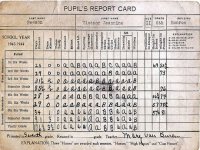Parents: Start With the A
Benjamin Zander, the conductor of the Boston Philharmonic, has a wonderful talk on how to give an A to students. On the first day of class, he tells all of his students that they will receive an A, and all they have to do for it is write him a letter -- from the perspective of the end of the year, looking back -- explaining what they did to earn that A. He marvels at the insights students share in these letters and the way that they fall in love with the person they have become. He also shares that, by putting the A up front, he has taken steps to build relationships with his students. For Benjamin Zander, it's all about how he views his students, starting from a place of asset and not deficit. He starts with the A.
The beginning of every school year brings optimism. We have hopes and dreams for our children, and we enter into the school year with the belief in a child's capacity to grow, prosper and excel. We start with the A.
As you think about the first days and weeks of school with your child, have a conversation about the things he or she loves to do and is good at doing, both in and out of school. Celebrate those strengths and interests, and figure out a way to maximize the time that your child will have to explore and expand on them. It might be in the form of an after-school class, or an upper-school elective, or time at home on the weekends to play and tinker with that interest. Give your child an A to start the year, and imagine together what the year will look like with the opportunity to build and deepen passions and interests.
Staging for Success
At the same time, we have worries for children. We worry about academics, friendships, and advisor and class placements.
Schools put a lot of time, care and effort into placements, balancing academics and friendships along with other factors that include learning styles, race, gender, geography, ability level, behavior and special needs. Many schools use a team approach, bringing teachers together, grade level by grade level, to discuss placements and to gather the wisdom of all the teachers for input about the following school year. It is an extensive process. Schools value their role in providing students with the opportunity to build new friendships with peers and new relationships with teachers. Many schools also ask families to fill out a questionnaire that provides the advisor and homeroom teacher with additional perspective and information on the child.
As school starts, kids delight in finding out who their teacher will be. When you receive your child's class placements, be excited and optimistic about the year ahead. You can help to set the right tone with for your child and with the school. Start with the A.
